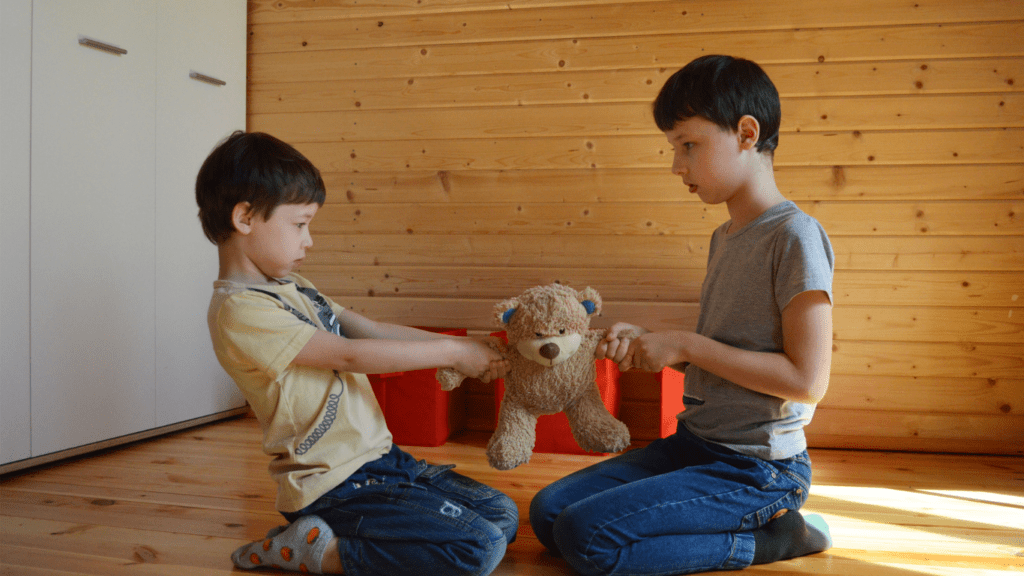Understanding Sibling Rivalry
Sibling rivalry usually begins after the arrival of a new sibling and continues through adolescence. It typically manifests as jealousy, competition, and fights over attention, resources, and validation. According to the American Academy of Pediatrics, it’s a normal part of growth and development, yet it can be a source of stress for families.
Common Causes of Sibling Rivalry
Various factors contribute to sibling rivalry. Birth order plays a significant role. Older children often feel neglected or displaced by younger siblings. Similarly, children close in age tend to compete intensely for parental attention and resources. Individual temperaments also impact how siblings interact. Differences in personality or interests can lead to clashes. Furthermore, family dynamics, like parental favoritism and differing disciplinary styles, exacerbate conflicts.
| Factor | Description |
|---|---|
| Birth Order | Older children feeling neglected |
| Close Age Gaps | Increased competition for attention |
| Individual Temperaments | Personality clashes |
| Family Dynamics | Favoritism & varying disciplinary styles |
Psychological Impact
The psychological effects of sibling rivalry can range from mild to severe. Children may develop low self-esteem if they constantly feel compared to their siblings. Anxiety and depression are also possible outcomes. Chronic conflict can lead to long-term issues in relationships and social interactions. According to a study in the Journal of Family Psychology, children’s emotional well-being can be significantly influenced by their experiences with sibling rivalry.
Signs to Look Out For
Parents need to watch for signs of sibling rivalry. Frequent arguments, name-calling, physical altercations, and tattling are common indicators. Behavioral changes, like withdrawal or aggression, also signal underlying issues. Noticing patterns can help in identifying the specific triggers and addressing them proactively.
The Necessary Attention
Addressing sibling rivalry requires consistent attention. Involving children in conflict resolution teaches them negotiation skills and empathy. Encouraging cooperative activities builds positive interactions. Maintaining fairness and avoiding comparisons mitigates feelings of jealousy and competition. Developing a culture of open communication and mutual respect sets the foundation for healthier sibling relationships and a more peaceful home environment.
Common Causes of Sibling Rivalry

Sibling rivalry can arise from several contributing factors.
Age Difference
The age gap between siblings impacts the dynamics of their relationship. If the age difference is small, frequent conflicts may arise due to similar developmental stages. On the other hand, if a larger age gap exists, older children might feel burdened by the care of younger siblings.
Personality Clashes
Different temperaments can lead to disagreements and misunderstandings. For example, one child might be more introverted while another is outgoing, causing friction. Diverse interests and ways of handling stress can also contribute to rivalry.
Parental Attention
Parental attention plays a critical role in sibling relationships. When one child perceives favoritism, jealousy and competition can arise. If parents don’t distribute their time and resources evenly, conflicts might escalate. Balancing attention among siblings helps in reducing rivalry.
Strategies for Peaceful Parenting
Managing sibling rivalry involves implementing effective strategies to foster a harmonious home environment. Here’s how I approach various aspects:
Setting Ground Rules
Establishing clear house rules helps children understand acceptable behavior. I outline specific expectations, including not hitting, name-calling, or taking each other’s possessions without permission. By involving the children in creating these rules, they feel a sense of ownership and responsibility, which promotes adherence. Consistent enforcement is crucial to maintain discipline and fairness.
Encouraging Positive Behavior
Positive reinforcement works wonders in encouraging good behavior. I praise my children when they share, cooperate, or show kindness towards each other. This reinforcement could be verbal praise, extra playtime, or a fun family activity. A behavior chart can also be effective in visually tracking and rewarding positive actions, making children feel motivated to behave well.
Fair Conflict Resolution
Addressing conflicts fairly teaches children essential problem-solving skills. I act as a mediator, guiding my children to express their feelings calmly and listen to each other. Implementing a cool-down period before discussions can help de-escalate tensions. I emphasize finding a win-win solution where both parties feel heard and satisfied, strengthening their conflict resolution skills and emotional intelligence.
By consciously applying these strategies, parents can reduce sibling rivalry and nurture a peaceful, loving household.
Building Strong Sibling Bonds
Creating strong sibling bonds is essential for fostering harmony at home. Shared experiences and teamwork can help build these connections.
Shared Activities
Organizing shared activities allows siblings to connect positively. Encourage activities like:
- board games
- sports
- creative projects
that require collaboration. For instance, playing a team sport can help improve cooperation and mutual trust. Opt for activities that match their interests, ensuring all siblings feel engaged.
Teamwork and Cooperation
Promote teamwork through cooperative tasks. Assign household chores that require siblings to work together, such as setting the table or cleaning a room. Highlight the importance of cooperation and mutual support. Create family projects, like gardening or cooking, that need planning and joint effort. These experiences provide opportunities for siblings to practice effective communication and problem-solving together.
Role of Parents in Mediating Conflicts
Parents play a pivotal role in managing sibling conflicts. I observe their actions greatly influence the dynamics between siblings.
Remaining Neutral
Parents should remain neutral during conflicts. I notice favoritism intensifies rivalry, causing resentment and jealousy. I intervene without taking sides, ensuring both children feel heard. By acknowledging each child’s feelings, I foster a sense of fairness and trust. If siblings believe I favor one over the other, it can damage their relationship and my credibility.
Effective Communication
Effective communication is essential. I model respectful dialogue by using “I” statements and encouraging children to express their feelings clearly. For instance, instead of saying, “You always take my things,” a child can say, “I feel upset when my things are taken without asking.” This approach minimizes accusations and promotes understanding. Active listening, where I repeat back what each child says, further ensures everyone feels understood and validated.



 David Withers – Senior Parenting Advisor David Withers brings over 15 years of expertise in child development and family dynamics to his role as Senior Parenting Advisor at Makes Parenting Watch. A respected voice in the parenting community, David has worked extensively with families, helping them navigate the complexities of raising children through every phase of life—from infancy to adolescence. His articles are known for their evidence-based approach, offering parents practical, actionable tips on topics such as sleep training, positive discipline, developmental milestones, and fostering emotional resilience in children. In addition to his writing, David conducts workshops and webinars to provide personalized advice to parents dealing with specific challenges. His deep understanding of child psychology and development ensures that Makes Parenting Watch remains a valuable and reliable resource for parents seeking guidance in today’s fast-paced world.
David Withers – Senior Parenting Advisor David Withers brings over 15 years of expertise in child development and family dynamics to his role as Senior Parenting Advisor at Makes Parenting Watch. A respected voice in the parenting community, David has worked extensively with families, helping them navigate the complexities of raising children through every phase of life—from infancy to adolescence. His articles are known for their evidence-based approach, offering parents practical, actionable tips on topics such as sleep training, positive discipline, developmental milestones, and fostering emotional resilience in children. In addition to his writing, David conducts workshops and webinars to provide personalized advice to parents dealing with specific challenges. His deep understanding of child psychology and development ensures that Makes Parenting Watch remains a valuable and reliable resource for parents seeking guidance in today’s fast-paced world.
